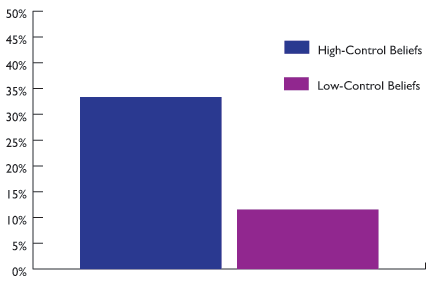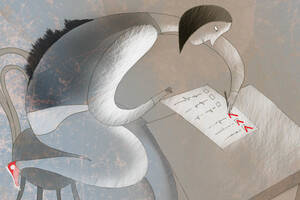Leadership Organizations Aug 3, 2009
Beware the Siren’s Song
Maintain self-control by avoiding temptation
Homer wrote of Odysseus that he was so worried about the allure of the siren’s song, he put wax in his shipmates’ ears and had himself tied to his ship’s mast. Unlike that hero of mythology, though, most people overestimate their capacity to control their impulses, according to Loran Nordgren (Assistant Professor of Management and Organizations at the Kellogg School of Management). Furthermore, he says, erroneous beliefs about one’s capacity for exercising restraint can lead to maladaptive self-control strategies.
When people are put to the test about their ability to resist cutting corners or engaging in policies that are unethical, “they are going to be surprised at how powerful those temptations are,” Nordgren says.
Working with Joop van der Pligt (Director of the Psychology Research Institute at the University of Amsterdam) and Frenk van Harreveld (Coordinator of the Teaching Program of the Social Psychology Department at the University of Amsterdam), Nordgren examined how impulse-control beliefs—the belief in one’s ability to regulate impulses such as hunger, drug craving, and sexual arousal—influence the self-control process. The researchers investigated whether impulsive states are perceived to be easy or difficult to overcome and the implications of these beliefs for how individuals approach the self-control process. They found that, generally, people have a restraint bias: the tendency to overestimate one’s capacity for impulse control. Restraint bias causes people to miscalculate the amount of temptation they can really handle, which in turn leads to a greater likelihood of indulging impulsive or addictive behavior.
Impulsive States and the Empathy Gap
Previous research has shown that people often have difficulty appreciating the power of impulsive states. Numerous studies have shown that people in a “cold state” (not experiencing hunger, anger, sexual arousal, etc.) tend to underestimate how a “hot,” impulsive state will influence their behavior. This is known as the “empathy gap.” Nordgren and his colleagues extended the empathy gap research by testing several hypotheses: people in a cold, non-impulsive state will overestimate their impulse-control capacity; people in a hot, impulsive state will have a more realistic view of their capacity for impulse control; and people who perceive that they have a high capacity for impulse control will expose themselves to more temptation and will ultimately exhibit more impulsive behavior.
Fatigue
The researchers conducted four experiments. The first examined the relationship between students’ beliefs about mental fatigue and their planned study schedules. Half the 72 college students were randomly assigned to memorize strings of numbers at a fast pace for nearly twenty minutes. In previous research, this task has been shown to induce mental fatigue. After completing the memory task, these students were asked to rate their present level of mental fatigue, to assess how much self-control they had over mental fatigue, and to indicate how they intended to distribute their workload during the following semester. Students who performed a non-fatiguing memory task answered the same questions.
Compared with non-fatigued participants, fatigued subjects estimated that they had significantly less control over mental fatigue, and they decided to leave significantly less of their studying for the final week of the next semester. Differences in impulse-control beliefs fully accounted for the relationship between fatigue and intentions not to cram, Nordgren and his colleagues determined.
Hunger
Study 2 tested whether hunger influences impulse-control beliefs and decisions not to indulge hunger-driven temptation. In this experiment, 79 people were approached either as they entered a cafeteria (the “hungry” group) or exited (the “satiated” group). All participants were asked to rank seven snacks from least to most favorite, then select a snack (which was tagged with a sticker for later identification). They were told that they could eat the snack whenever they chose, but if they returned the item one week later, they would be paid four Euros and also be able to keep the snack.
After choosing a snack, the participants answered a questionnaire that assessed their present hunger state and their impulse-control beliefs. The results showed that the satiated subjects believed they had more control over their impulses compared with the hungry participants. As expected, the satiated participants surrendered to higher levels of temptation, usually selecting their favorite or second-favorite snack. In comparison, hungry participants tended to choose their second- or third-favorite snack. In both groups, a stronger belief in the ability to resist temptation resulted in choosing a more tempting snack.
About half the participants returned the snack, but overall they had chosen a less favored snack than those who did not return the snack. Also, people in the satiated group, who in general had chosen more tempting snacks, were significantly less likely to return the snacks than people in the hungry group.
Smoking
Study 3 was designed to test the direct effect of impulse-control beliefs on exposure to temptation by having heavy smokers play a self-control game that pitted their temptation to smoke against the chance to win money. All 53 college students took the same test and were told it measured their ability to control their impulses. In reality, it was simply a word association test. About half of the participants were given feedback saying their test scores revealed a high capacity for impulse control; the remaining participants were told that they had a low capacity for impulse control.
After taking the test, participants watched the film Coffee and Cigarettes, the goal being to refrain from having a cigarette during the time they were watching the film. They were allowed to choose from among four levels of temptation: keeping their cigarette in another room, keeping their cigarette on a desk in the testing cubicle, holding a cigarette in their hand throughout the film, or holding their unlit cigarette in their mouth. The higher the level of temptation, the higher the payout was for resisting temptation, from two to four Euros.
Participants who had been told they had a high capacity for impulse control selected more tempting options than those in the so-called low-impulse-control group. The researchers report, “On average, low-control participants chose to watch the film with their cigarette on the table, whereas the average high-control participant chose to watch the film with the cigarette in their hand.” The participants who believed they had high impulse control performed more poorly on the test: 33.33 percent of the high-control group failed to abstain from smoking during the film, compared with 11.52 percent of participants in the low-control condition (see Figure 1). The researchers conclude that the study “provides direct evidence for the prediction that impulse-control beliefs influence exposure to temptation and provides additional support for the notion that inflated impulse-control beliefs promote impulsive behavior.”
Figure 1: Percentage of Failure to Abstain from Smoking in Study 3

Ex-Smokers
Study 4 also investigated cigarette addiction. The researchers designed it to test the notion that once out of initial withdrawal, recovering addicts begin to overestimate their capacity to overcome drug cravings elicited by drug-related cues (such as visiting places they associate with drug use) and consequently overexpose themselves to temptation.
Fifty-five participants in a smoking cessation program, who had abstained from cigarettes for at least three weeks, were asked to estimate their capacity to control cigarette cravings and indicate the amount of smoking temptation they subjected themselves to. The researchers followed up with them four months later. They found that smokers who perceived themselves to have a high capacity for impulse control reported less avoidance of smoking temptations, and smokers who reported less avoidance of smoking temptations had a higher rate of relapse four months later. “Natural variation in impulse-control beliefs not only influences how people approach self-control dilemmas,” the authors conclude, “but also influences the success of their self-control efforts.”
Taken together, these four studies show that “we have less restraint than we think we do,” Nordgren notes. “The recent lending crisis provides an example of how restraint bias plays out in the business world,” he said. “There was quite a lot of temptation to cut corners and act shortsightedly and there weren’t a lot of guidelines and restraints on people’s behavior.”
According to Nordgren, “This question of how much temptation we should expose ourselves to is important across many self-control contacts. If you’re a recovering addict you need to decide, ‘Can I go back to people and places that were related to that addiction?’ If you’re thinking about temptation in a business context you might ask, ‘How much oversight should we have? What kind of regulatory guidelines do we need?’
“A system that just assumes that people are going to restrain themselves is going to fall prey to this restraint bias,” Nordgren warns. “We expose ourselves to more temptation than is wise.”
Nordgren, Loran, Joop van der Pligt, and Frenk van Harreveld. 2009. “The Restraint Bias: How the illusion of self-restraint promotes impulsive behavior.” Forthcoming Psychological Science.


